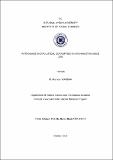JavaScript is disabled for your browser. Some features of this site may not work without it.
| dc.contributor.author | WARDAK, M. Mansoor
|
|
| dc.date.accessioned | 2021-04-14T07:18:25Z | |
| dc.date.available | 2021-04-14T07:18:25Z | |
| dc.date.issued | 2018 | |
| dc.identifier.uri | http://hdl.handle.net/11547/7043 | |
| dc.description.abstract | The present thesis about political corruption and patronage in Afghanistan, aims to determine the genesis for the problem of corruption and find out the causes, effects, acts and types of corruption initially. This thesis emphasizes that the main causes of corruption are weak rule of law, lack of transparency and accountability in government expenditures, low wages of public servants, corrupt judiciary, nepotism, the monopoly-power of high-ranking officials that provide opportunities for corruption. The thesis goes on discussing the history of Afghanistan and providing a profound understanding of political corruption and patronage in Afghanistan since 2001. The debates on the effects of corruption on economic growth and public procurement will be discussed in detail. This thesis found that the effects of corruption on economic growth are negative, corruption decreases investment and leads to poor quality of goods and services. This thesis will provide recommendations for eliminating the problem of corruption. Moreover,the failed strategies of government to curb corruption will be discussed for example the attempt of High Office for Oversight (HOO) and the new strategies developed to fight corruption in Afghanistan will be discussed, such as, Afghan National Strategy to Combat Corruption (ANSCC). Corruption is an international problem for both developed and developing countries and both are experiencing various forms and types of corruption. In some countries such as Afghanistan, this problem became a serious obstacle for the development of the country and lead to poverty, unemployment of skillfullabor, insecurity, poor government performances and lack of education opportunities. The research aims to find the reasons behind corruption in Afghanistan and show the devastating effects of corruption on different aspects of life. Looking to the history of Afghanistan the main factors that promoted corruption in Afghanistan were a huge inflow of international capital for the reconstruction of Afghanistan with no or less accountability and three decades of war and brutality lead to erosion of Afghan institutions, furthermore, imposed psychological pressure on the minds of the public. So this situation led to decrease public hope for a prosperous future in the country. Corruption in Afghanistan seriously damaged the trust of the public to government and decreased national and international investment in the country. Corruption perception is different from a country to another country, for example, one person‘s gift will be another person‘s bribe. So, even the acts of corruption have no common perception among the scholars. | tr_TR |
| dc.title | PATRONAGE AND POLITICAL CORRUPTION IN AFGHANISTAN SINCE 2001 | tr_TR |
Files in this item
This item appears in the following Collection(s)
-
Tezler -- Thesis [3470]
